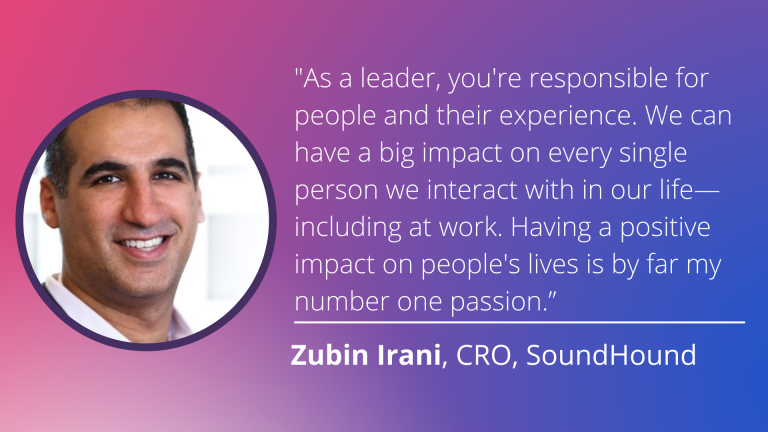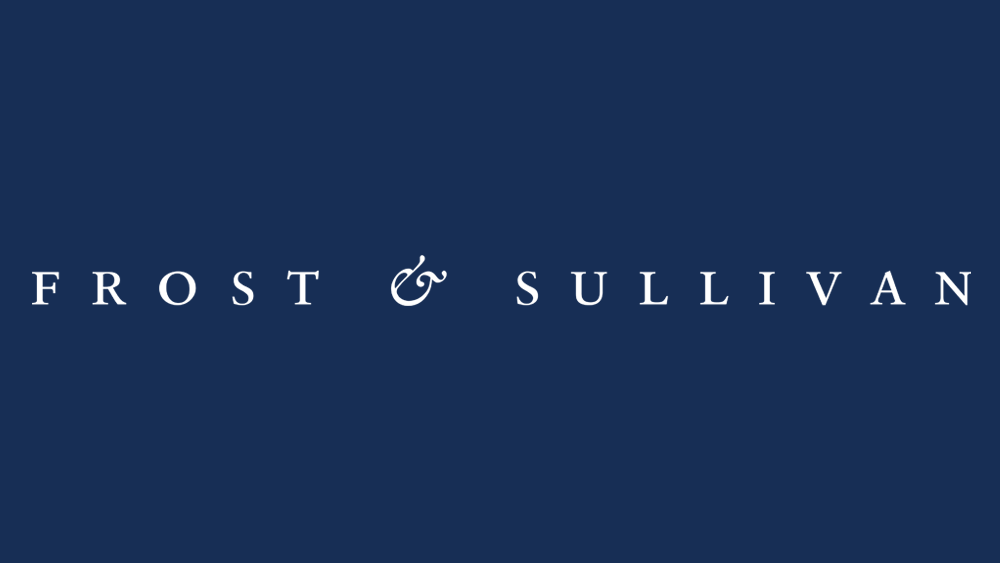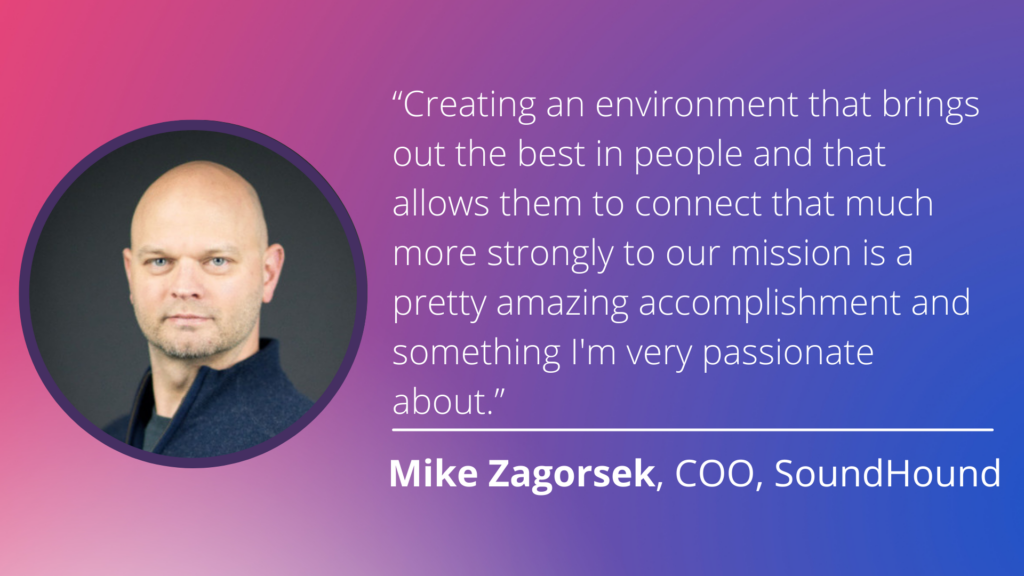
Building an Exceptional Culture with SoundHound’s CRO, Zubin Irani
Meet our Executive team! We’re back with our Executive Interview Series, this time interviewing SoundHound’s Chief Revenue Officer, Zubin Irani.
Products
Our Platform
SoundHound’s independent voice AI platform is built for more natural conversation.
Solutions
For Every Industry
Find a customizable and scalable voice AI solution for your industry or use case.
Resources
Get the latest voice AI news, keep up on trends, get expert advice, and discover new solutions.
Our Company

Frost & Sullivan Names SoundHound AI a Leader for Enterprise Conversational AI in Healthcare 2024


“The opportunity to work in an environment that is creating the type of technologies that you see in movies and on TV is pretty thrilling,” says SoundHound’s COO Mike Zagorsek on his love for SciFi and Star Trek and how that passion influences his job.
Meet our Executive team! We’re back with our Executive Interview Series, this time interviewing SoundHound’s Chief Operating Officer, Mike Zagorsek. In the interview, he discusses the skills needed to become a COO, company culture, attracting talent, why he decided to join SoundHound, what he’s passionate about, the future of conversational AI, and more.
This interview is part of a series of executive spotlights. Stay tuned for more great insights from our executive team and C-Suite in the next few months!
Mike: The COO role is unique in that it’s probably the role that changes the most from organization to organization. You can have a group of people from different companies and not necessarily see a lot of overlap because what the organization needs is often very specific.
What the company needs from a COO can vary based on the industry that they’re in, as well as what functions and responsibilities are taken care of by some of the other leaders on the team. There’s an article by HBR, Second in Command: The Misunderstood Role of the Chief Operating Officer, that did a lot of research on the seven roles of a COO. It ranges from The Executor—somebody who’s making sure things are getting done. Then there’s also The Change Agent, The Other Half, The Partner, and more. The relationship between the CEO and the other executives will determine what the role needs to be.
The one thing that’s probably the most constant is that it appeals to people who are really looking for efficiency and effectiveness or asking themselves, “Are we prioritizing the right things? Are our people working on the right projects and programs? Are our different functions working together effectively?”
Ultimately, if an organization can’t use its teams and its resources in the best possible way, it’s an inhibitor to success. Even though there are a lot of different roles a COO can play, striving for that effectiveness, prioritization, efficiency, and collaboration are universal.
Marketing has evolved over the past decade or so. It’s become increasingly digital, increasingly measurable. Marketers in the past had more challenges. Now, so many activities are trackable. They’re able to be measured in ways using tools that didn’t exist before.
In essence, strong marketing leaders have been almost forced to become strong operators and understand how different programs work together to produce the types of risks that reinforce further investment and further implementations. Having experienced that transition, particularly in a growing company where there aren’t necessarily a lot of tools and processes and roles in place, creating some of those becomes operational in nature.
At that point, you realize that there are other departments that benefit from those same things. In essence, marketing itself has become more operational. There’s definitely a creative component to it, but the operations are critical, and learning some of those things becomes universal.
It’s also changing the relationship that companies have with marketing departments. It’s evolving what marketing leaders have become. Ultimately, successful operations are central to leadership.
The first thought that comes to mind is that every person in an organization influences company culture. What is culture? Culture is the intangible collection of every individual, their behaviors, contributions, impressions, attitudes, and beliefs. As a person, I am just as much of a cultural influencer as anyone else in the organization because we all have an equal role in it.
When it comes to how I spend my time and the things I think about, it’s really important to listen and look for patterns. It’s great to work with our people teams and the various leaders and see what they are hearing from their people and what’s working and then figure out ways to amplify that.
The stories that we share, the things we talk about, and the successes that we recognize aren’t just business results. They aren’t just these measurable outcomes, but they’re real stories about people who are representative of the values that we all share.
In addition to being a cultural contributor as a team member, there are certain roles in the organization that could become amplifiers. It’s invigorating to find those stories and identify them and create reinforcing principles behind them in a way that helps us become that much stronger as a company and a team.
The world that we’ve seen over the past couple of years has forced people and companies to reassess what it means to work, what it means to commit your time to an organization, and how those patterns reflect things that work better for us as individuals. Now that we seem to be on the cusp of returning to a degree of normalcy, depending on where you live, those questions are being asked again in a different way. Does the world today look different than it did before?
You have to be flexible with the individual. No one person is going to have a similar circumstance. It’s important for teams and companies to create an environment that is meaningful for the individual to do the type of work that works best for them.
Someone well-taken care of is going to be effective with a team, and an effective team is going to create good results. In the end, flexibility is the name of the game. It’s not forcing a worldview upon a world that isn’t ready to accept that change. Rather, it’s listening to what you’re seeing, adapting to it, and leading towards a working solution. That’s going to be optimal for everybody involved.
At the end of the day, I go back to listening to what people think and turning those insights into actions. That’s going to create a healthy and productive environment for everyone.
If you have the type of organization that represents those values, the people who work for it are going to appreciate it. People looking to potentially make a change and come into an organization like ours will start to see that approach come through in the interview processes and the learning process. Ultimately, we become the type of place where people stay and where they want to join and do their best work.
For anyone who’s a fan of Star Trek or Sci-Fi in general, the opportunity to work in an environment that is creating the type of technologies that you see in movies and on TV is pretty thrilling.
There’s something really exciting about seeing something on TV and going back to your role and saying, at some point, the breakthroughs that were needed to create that vision in something like Star Trek are happening in front of you on a daily and weekly basis. That becomes inspirational.
When I thought about how my career has progressed in the various opportunities I had taken on, it actually reminded me of a quote from Steve Jobs at his Stanford commencement speech in 2005. He says, “You never really know where things are going in the future. You can only really connect the dots in reverse.”
I was always fascinated by technology and also how people interacted with technology. I had that business and people side of it, as well as that curiosity about technology and software and how things are built. I started at advertising agencies, but I was always working on the digital side of it, especially when it was new.
I was comfortable with the technology where many people weren’t. I found that I was at that intersection of people in technology at various points in each role I had, whether it was on the advertising agency side or when I worked at Apple, that always fascinated me. To take it to the next level, we’re creating technology that people fundamentally interact with, and they interact with it in a fundamentally human way where the technology itself is invisible. That’s really powerful.
When I look back on the various roles I’ve taken and the times I’ve been the most inspired, it’s been creating the type of change that we’re able to see come to fruition at SoundHound.
I am very passionate about SoundHound’s mission, which is to voice-enable the world, meaning that you can interact with products and technology around you the way you would interact with people, just by speaking. That mission is very motivating. It’s a passion that I have and that everybody at SoundHound shares to varying degrees. To me, it is something that we can actually make a reality, which fuels a lot of passions.
In addition, I’m really passionate about creating an environment where people can do their best work, meaning that you’re motivated by your team and, ultimately, the context of what we’re doing.
We’re creating these voice-enabled experiences, and if I can help work with teams to create structures, processes, workflows, and prioritization that creates an environment where people themselves can do great work, that is motivating for me because, at the end of the day, there are so many companies out there doing so many amazing things. The difference is the people you do it with and the environment you’re in.
Creating an environment that brings out the best in people and that allows them to connect that much more strongly to our mission is a pretty amazing accomplishment and something I’m very passionate about.
There’s one that jumps to mind. This was from a former manager of mine. One of the things she said was that as she’s grown organizations and teams, if you’re going to invest in a new area and create a new role, it could really help to actually do the role and to really understand it, especially as everybody in a growing organization has more and more responsibilities.
The opportunity to be hands-on and to understand what it takes to do a particular job or function is invaluable. In a way, that’s a lot more collaborative, and you understand how the pieces come together. I realized it’s not always easy to be hands-on or that involved, but any opportunity to do the work and understand it before it grows is key. If you’re finding yourself growing a team and taking on responsibilities, then invest the time, roll up your sleeves, and get a better sense of what’s happening because only through the doing or the involvement can you get the appreciation.
There’s the idea of having a voice interface, right? You can use your voice to make something happen around you. The AI component is powerful because that’s the difference between voice as a simple form of interaction versus true conversations.
The true manifestation of voice AI is the ability to have conversations with technology like you would people. We’re already seeing the impact of the first point. We’re able to control products and ask questions, even complex questions, with SoundHound’s technology.
That is already influencing the future because we’re able to have a whole new category of products and interfaces, but it’s that next step towards that conversational interface where the various personalities, functions, and environments can be enabled. We’ll reach a true inflection point.
The other is that it’s both physical and virtual. We talk about physical products and smart devices, speakers, and cars, but also virtual is happening more and more. There’s a lot of talk about these virtual spaces, metaverse, and such.
The ability to have a conversational interface in those virtual environments is really powerful. That will be another angle to consider in how the spaces around us can become voice-enabled.
It’s a massive opportunity because more and more companies are going to be investing in their own voice assistants and finding ways to make their products and services come alive in ways that were limited before.
When the internet came along, every company had to have a website. When the mobile phones came along, every company had to have an optimized experience on an app. With voice interfaces, every company is going to have to have a voice presence to interact with.
Need more insights? Watch the interview:
Want to learn more about our executives? Check out our other interviews:
At SoundHound, we have all the tools and expertise needed to create custom voice assistants and a consistent brand voice. Explore SoundHound’s independent voice AI platform at SoundHound.com and register for a free account here. Want to learn more? Talk to us about how we can help bring your voice strategy to life.
Subscribe today to stay informed and get regular updates from SoundHound Inc.